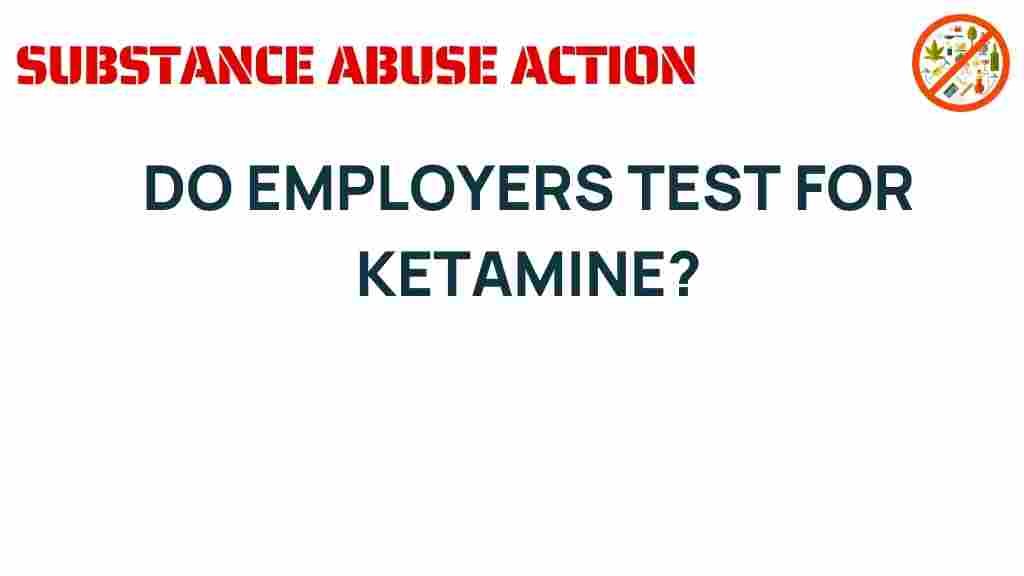Are Employers Testing for Ketamine? Understanding Workplace Drug Testing
In recent years, the conversation surrounding workplace drug testing has taken on new dimensions, particularly with the rise in popularity and recognition of various substances like ketamine. Often associated with its use in mental health treatment, ketamine presents unique challenges and considerations for employer policies. In this article, we will explore the truth behind workplace drug testing for ketamine, the implications for employees, and the evolving landscape of employer policies regarding substance abuse.
Understanding Ketamine and Its Use
Ketamine is a dissociative anesthetic that has gained attention for its potential in treating mental health disorders, including depression and PTSD. Originally developed for surgical procedures, it is now being utilized in controlled clinical settings for its rapid antidepressant effects. However, its recreational use raises concerns about substance abuse.
The Rise of Workplace Drug Testing
Workplace drug testing has become a standard practice for many employers aiming to maintain a safe and productive work environment. While traditional substances like alcohol and marijuana are commonly tested, the question arises: are employers testing for ketamine? Here’s an overview of workplace drug testing:
- Purpose: To ensure employee safety, reduce liability, and maintain productivity.
- Common Substances Tested: Alcohol, marijuana, cocaine, opiates, and amphetamines.
- Testing Methods: Urine, blood, saliva, and hair tests.
Employer Policies and Ketamine
The legal landscape surrounding drug testing is complex, and employer policies can vary widely. Many organizations have adopted strict drug-free workplace policies, but the inclusion of ketamine in these policies is less clear. Here are some key points regarding employer policies on ketamine:
- Testing for Ketamine: While not as common as other substances, some employers may include ketamine in their drug screening panels, especially in sectors where safety is paramount.
- Legal Implications: The legality of testing for ketamine depends on state laws and the nature of the job. Employers must navigate the legal implications of testing and ensure they comply with regulations.
- Employee Rights: Employees have rights regarding drug testing, including privacy rights and the right to contest positive results.
Does Testing for Ketamine Violate Employee Rights?
Understanding employee rights in the context of drug testing is critical. Employees should be aware of the following:
- Consent: Employers typically require employees to consent to drug testing as part of their employment agreement.
- Confidentiality: Employers must handle drug test results confidentially to protect employee privacy.
- Discrimination: Employers cannot discriminate against employees based solely on a positive ketamine test if the employee has a valid prescription for the medication.
The Role of Mental Health in Substance Abuse Policies
With the increasing recognition of mental health issues, it is essential for employers to consider how their drug policies affect employees seeking treatment. Ketamine’s role in mental health treatment has sparked discussions about addiction recovery and workplace policies.
Employers should be aware that:
- Support for Employees: Providing support for mental health issues can lead to better employee outcomes and reduce substance abuse.
- Education and Awareness: Employers can benefit from educating their workforce about the legitimate medical uses of ketamine and the importance of seeking help for mental health issues.
Step-by-Step Process: How Employers Implement Drug Screening Policies
Implementing drug screening policies involves several steps that ensure fairness, legality, and effectiveness. Here’s a breakdown of this process:
1. Establish Clear Policies
Employers should develop comprehensive drug policies that clearly outline:
- Which substances are tested.
- The circumstances under which testing occurs (pre-employment, random, post-accident).
- The consequences of positive test results.
2. Communicate Policies to Employees
Transparency is key. Employers should:
- Provide employees with a copy of the drug policy.
- Conduct training sessions to explain the importance of the policy and how it will be enforced.
3. Choose a Reliable Testing Method
Selecting a reputable testing service is vital. Employers should consider:
- Testing methods that are accurate and reliable.
- Services that comply with legal standards and regulations.
4. Ensure Confidentiality and Compliance
Employers must protect employee privacy by:
- Keeping test results confidential.
- Following all legal requirements related to drug testing.
5. Provide Support for Employees
Employers should consider offering:
- Resources for addiction recovery.
- Access to mental health services and counseling.
Troubleshooting Tips for Employees Facing Drug Testing
For employees who may be concerned about drug testing, especially regarding ketamine, here are some troubleshooting tips:
1. Know Your Rights
Familiarize yourself with your rights related to drug testing in your workplace. Understand the policies and your legal protections.
2. Be Honest About Medication
If you are prescribed ketamine for legitimate medical reasons, inform your employer or HR department before testing. Documentation from your healthcare provider can be helpful.
3. Seek Support
If you are struggling with substance abuse or mental health issues, seek support from a professional. There are resources available for addiction recovery that can guide you through the process.
4. Understand the Testing Process
Knowing how drug testing works can alleviate some anxiety. Understand the testing methods, how results are interpreted, and what constitutes a positive result.
Conclusion: The Future of Ketamine in Workplace Drug Testing
As the landscape of mental health treatment continues to evolve, employers must adapt their workplace drug testing policies accordingly. The inclusion of ketamine in these policies is still a developing issue, with varying approaches depending on industry standards and legal regulations.
Employers have the responsibility to create safe work environments while also supporting their employees’ mental health. By understanding the implications of testing for ketamine, and by fostering an environment of transparency and support, employers can navigate the complexities of workplace drug policies effectively.
For more information on workplace rights and substance abuse policies, visit this resource. If you’re looking for support for mental health or addiction recovery, consider reaching out to local services or organizations that specialize in these areas.
This article is in the category Prevention and created by SubstanceAbuseAction Team
